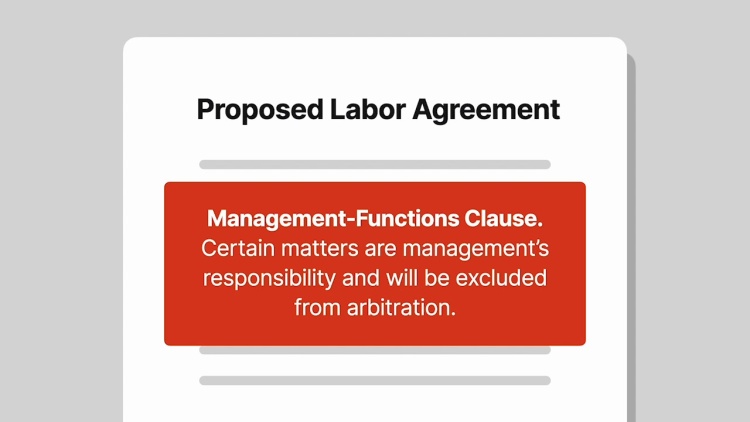National Labor Relations Board v. American National Insurance Co.
United States Supreme Court
343 U.S. 395 (1952)
- Written by Rose VanHofwegen, JD
Facts
American National Insurance Company (defendant) began negotiating a contract with a union that represented its office employees. The union proposed a clause requiring submission of all disputes to a grievance and arbitration procedure. But the company objected to an unlimited arbitration provision and wanted a management-functions clause that reserved management authority over matters like scheduling and discipline, exempting those issues from arbitration. The union rejected any clause that exempted matters subject to mandatory collective bargaining under the National Labor Relations Act (NLRA) and filed unfair-labor-practice charges, alleging the company refused to bargain. The trial examiner found that employers may bargain for clauses reserving certain decisions to management, and the parties signed an agreement with a slightly narrower management-functions clause than originally proposed. But the National Labor Relations Board (NLRB) (plaintiff) rejected the examiner’s findings, reasoning that the clause violated the duty to bargain in good faith. Therefore, the NLRB ordered the company to bargain and explicitly prohibited any management-functions clause covering conditions of employment. But the appellate court reversed and refused to enforce the NLRB’s order, finding that the company negotiated for the clause in good faith. The Supreme Court granted review.
Rule of Law
Issue
Holding and Reasoning (Vinson, C.J.)
Dissent (Minton, J.)
What to do next…
Here's why 907,000 law students have relied on our case briefs:
- Written by law professors and practitioners, not other law students. 47,100 briefs, keyed to 996 casebooks. Top-notch customer support.
- The right amount of information, includes the facts, issues, rule of law, holding and reasoning, and any concurrences and dissents.
- Access in your classes, works on your mobile and tablet. Massive library of related video lessons and high quality multiple-choice questions.
- Easy to use, uniform format for every case brief. Written in plain English, not in legalese. Our briefs summarize and simplify; they don’t just repeat the court’s language.





